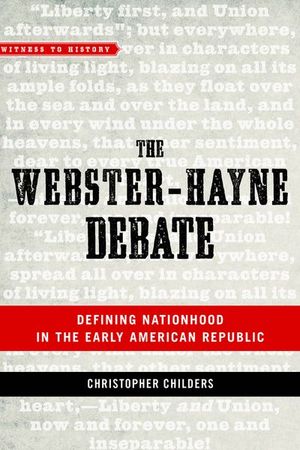The Webster-Hayne Debate
Published by Johns Hopkins University Press
In this illuminating history, a senatorial debate about states’ rights exemplifies the growing rift within pre-Civil War America.
Two generations after the founding, Americans still disagreed on the nature of the Union. Was it a confederation of sovereign states or a nation headed by a central government? To South Carolina Senator Robert Y. Hayne, only the vigilant protection of states’ rights could hold off an attack on a southern way of life built on slavery. Meanwhile, Massachusetts Senator Daniel Webster believed that the political and economic ascendancy of New England—and the nation—required a strong, activist national government.
In The Webster-Hayne Debate, historian Christopher Childers examines a sharp dispute in January 1830 that came to define the dilemma of America’s national identity. During Senate discussion of western land policy, the senators’ increasingly heated exchanges led to the question of union—its nature and its value in a federal republic. Childers argues that both Webster and Hayne, and the factions they represented, saw the West as key to the success of their political plans and sought to cultivate western support for their ideas.
A short, accessible account of the conflict and the related issues it addressed, The Webster-Hayne Debate captures an important moment in the early republic.
Two generations after the founding, Americans still disagreed on the nature of the Union. Was it a confederation of sovereign states or a nation headed by a central government? To South Carolina Senator Robert Y. Hayne, only the vigilant protection of states’ rights could hold off an attack on a southern way of life built on slavery. Meanwhile, Massachusetts Senator Daniel Webster believed that the political and economic ascendancy of New England—and the nation—required a strong, activist national government.
In The Webster-Hayne Debate, historian Christopher Childers examines a sharp dispute in January 1830 that came to define the dilemma of America’s national identity. During Senate discussion of western land policy, the senators’ increasingly heated exchanges led to the question of union—its nature and its value in a federal republic. Childers argues that both Webster and Hayne, and the factions they represented, saw the West as key to the success of their political plans and sought to cultivate western support for their ideas.
A short, accessible account of the conflict and the related issues it addressed, The Webster-Hayne Debate captures an important moment in the early republic.
BUY NOW FROM
COMMUNITY REVIEWS

